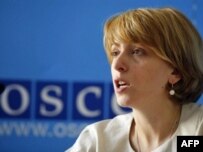Russia says Georgian breakup is 'irreversible'
| Publisher | Radio Free Europe/Radio Liberty |
| Author | Reuters |
| Publication Date | 29 August 2008 |
| Cite as | Radio Free Europe/Radio Liberty, Russia says Georgian breakup is 'irreversible', 29 August 2008, available at: https://www.refworld.org/docid/48b7ec72c.html [accessed 19 May 2023] |
| Disclaimer | This is not a UNHCR publication. UNHCR is not responsible for, nor does it necessarily endorse, its content. Any views expressed are solely those of the author or publisher and do not necessarily reflect those of UNHCR, the United Nations or its Member States. |
August 29, 2008
By Reuters
 Georgian Foreign Minister Ekaterine Tkeshelashvili in Vienna
Georgian Foreign Minister Ekaterine Tkeshelashvili in Vienna
VIENNA Russia has said the independence of two breakaway Georgian regions was irreversible, and Georgia said Russian-backed forces had almost completed the "ethnic cleansing" of Georgians from the areas.
Russia and Georgia have denied mutual accusations of seeking to oust civilians of either side after a short war this month sparked when Georgia tried to wrest back South Ossetia province by force and Russia unleashed an overwhelming counteroffensive.
The Kremlin on August 26 recognized the independence of South Ossetia and Abkhazia, another Moscow-aligned separatist region, stirring a Western outcry and talk of sanctions against Moscow.
"The process is irreversible," said Russia's ambassador to the 56-nation Organization for Security and Cooperation in Europe, following a special OSCE council meeting on the crisis.
"We were strongly in favor of the territorial stability and integrity of Georgia. But after the last act of aggression and act of genocide and ethnic cleansing, the South Ossetian and Abkhazian sides came to the conclusion that they can no longer live together with Georgia in one state," Anvar Azimov said.
"The reality is such that sooner or later the international community will come to an understanding of the existence of these two independent states.""The reality is such that sooner or later the international community will come to an understanding of the existence of these two independent states," he told reporters.
Azimov said the Kremlin would forge special treaties with South Ossetia and Abkhazia covering financial, economic, and military assistance and might beef up its "peacekeeping" force in South Ossetia.
Georgian Foreign Minister Ekaterine Tkeshelashvili said Russian-backed forces had almost finished driving out Georgians from rebel regions as part of a bid to reassert supremacy over Georgia, once ruled from Moscow under the old Soviet Union.
She told reporters after the OSCE meeting that "ethnic cleansing" had been carried out by Russian troops encircling towns while local militias swept in to expel residents and loot and burn their properties.
"The strategy is to create buffer zones, empty territories from which people have been expelled, all houses destroyed and fields burned so that it will be very difficult for people to return home even if security arrangements were made for that," she said.
It has been impossible to verify the extent of alleged human rights abuses in the conflict areas since foreign monitors have yet to be allowed into "buffer zones" set up by Russian forces.
